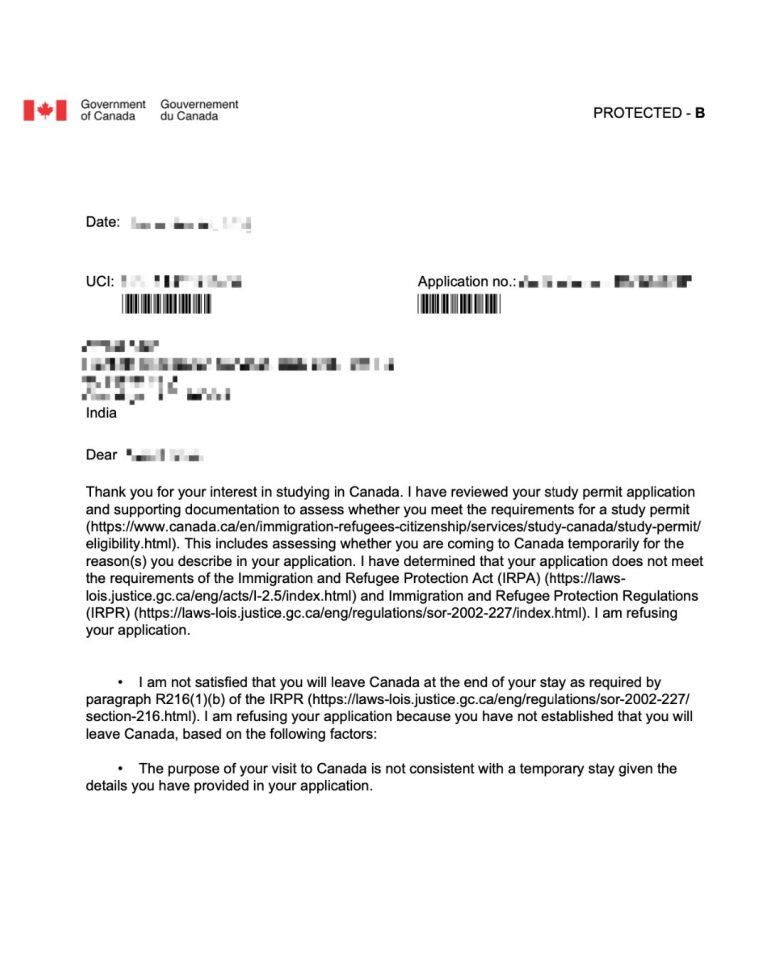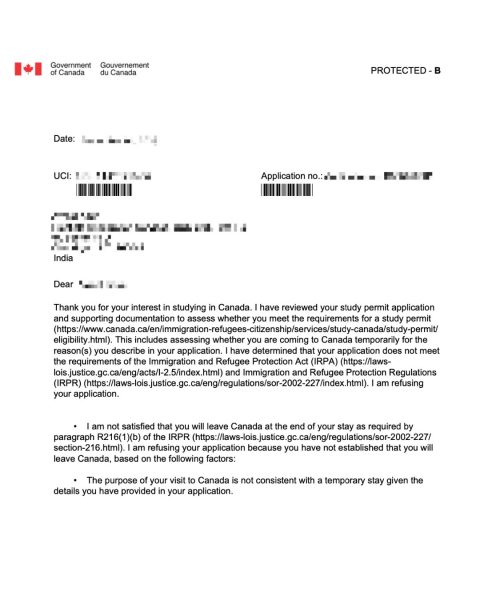Most students plan to study in Canada for a better future and better career opportunities. But the journey is not easy. Studying in a foreign country is no small decision. It takes a lot of financial planning, career planning, and personal planning, in addition to preparing ourselves for an emotional rollercoaster of the visa process, the travel process, and when finally starting studies in a new country.
In this process, thousands of study visa applications get refused every year. Let’s understand the different categories of study visas, the reasons for a refusal, the solutions and how can you go about finding a solution after multiple refusals. First things first, don’t give up your Canadian dream!
Canada Study Visa categories

There are 2 major categories under which students apply for pursuing education in Canada. The SDS category (Student Direct Stream) and the General category (Non-SDS).
The Student Direct Stream (SDS) is an expedited study visa processing program for those who are applying to study in Canada at a post-secondary designated learning institution (DLI).
The SDS is available to legal residents who reside in the following countries:
- Antigua and Barbuda
- Brazil
- China
- Colombia
- Costa Rica
- India
- Morocco
- Pakistan
- Peru
- Philippines
- Senegal
- Saint Vincent and the Grenadines
- Trinidad and Tobago
- Vietnam
If you do not meet all of the requirements of the SDS stream, your application automatically gets submitted in the General Category for a study visa.


Reasons for Study Visa refusals

When a visa application gets refused, you may feel that it’s the end of the road for you.
IRCC is extremely strict when it comes to reviewing the eligibility of study visa applications. Many applicants that are not able to prove their genuine intentions to study in Canada get refused.
Many times, eligible and genuine applications get refused, resulting in demoralization and hardship for the applicants (both financial and emotional).
At Richfield, we have decades of knowledge of the Canadian education system and deep expertise in Canadian Immigration Law. We have helped hundreds of students attain their dream of studying in Canada, even if they have received multiple prior refusals.
Now let us look at what are some of the common reasons for refusals of study visa applications:
Study visa applications are assessed under the IRPR Section 216(1). One of the most common reasons mentioned by the visa officer in a refusal letter is “I am not satisfied that you will leave Canada at the end of your stay, as stipulated in subsection 216(1) of the IRPR, based on the purpose of your visit”.
There are many reasons why study visa applications get refused by IRCC. Let us review them below:
- Not having a Letter of Acceptance (LOA) from a Designated Learning Institute (DLI)
- The program of proposed studies in Canada is not relevant to the applicant’s education or employment background
- Weak academic record
- Lack of funds for studying in Canada
- Inadequate language abilities in either English or French
- Questionable prior immigration history in Canada or in another country
- Serving a previous ban from Canada and not allowed to enter Canada.
- Incomplete academic or work experience documents
- Unclear career plan after completing education in Canada
- Gaps in education or work profile that are not explained properly in the application
- Refusals due to medical or criminal inadmissibility
- Insufficient travel history
- Hiding facts or lying on the study visa application
- Hiring the services of an Unlicensed Immigration Consultant (non-RCIC) and hiding the fact from IRCC in the application.
So what is the solution to the refusals?
The solution for your study visa refusals depends on the reason of your refusal.
Most of the times, the problem of refusals of a study visa application can be solved.
What varies though, is what will it take to turn the refusals into an approval?
Simpler issues
Turning some refusals around can be fairly straightforward. For example, if you have not attached all the required documentation and your application was refused for that reason, you can reapply by attaching the documentation in the future application.
If you did not have sufficient funds, you can make sure you meet the requirements for adequate funds in the future applications.
More complicated issues
But there can be other issues that can be a more challenging to fix.
For example, if you have been refused for the reason that you have selected a program/course of study in Canada but it was not found to be relevant to your background, you will need to understand exactly what went wrong in your judgement and then go about fixing the problem. If you simply just reapply in the same program of study, most likely you will get refused again.
Moreover, if you simply change your program of study to a different program or a different college/university, you can get refused again since you can not just change a program because the visa officer refused it last time.
Process after a refusal or multiple refusals
There are a few options available for an applicant if your Study Visa application gets refused. Let’s look at them below:
- Apply for reconsideration of the application
If you think a visa officer has made a mistake in assessing your application, a request for Reconsideration of the decision can be submitted to the visa office. Remember that visa officers will not consider any new evidence through this process and there is no obligation on IRCC to review reconsideration requests. Reconsideration should be done when you are fairly confident that the visa officer has made a mistake in the assessment of certain facts in your application.
If the reconsideration request is processed, the officer will review the application previously submitted to see if an error in assessment was made. - Re-apply for a Student visa
If you think you may have missed important documentary evidence to support your application and your application was refused for that reason, you will need to re-submit a fresh application for your visa with the new documents.
When you re-apply, make sure you submit a proper application and do not miss anything the next time. - Appeal to the Federal Court
If after multiple applications and after submitting everything that the visa officer needs to review the case, your application is still getting refused by IRCC, you can apply for a review of the process at the Federal Court of Canada.
Remember that if you are inside Canada, you will generally have 15 days after your refusal to submit an application for leave in the Federal Court. If you are outside Canada, you will generally get 60 days to submit the same application.
Now, how do you go about all this? What is the best way?
We suggest you to hire an expert RCIC who has experience in education in Canada, knows the Canadian Immigration and Refugee Protection Act (IRPA) requirements and understands your local visa office processing methods to successfully get your visa through a reconsideration or a re-application.
At Richfield, we routinely handle cases with multiple refusals and have a very high success rate. Whether you have 1 refusal or 10 refusals, we are confident that we can help you get your visa and help you keep the dream of studying in Canada alive
We have decades of experience in Canadian immigration and look forward to helping you.
Get your visa through reconsideration, re-application, or by appealing to the Federal Court - we are here to help you whatever your situation may be.
How else can we help you?
practice areas

Family Study visa
Study Visa + Spouse Open Work Permit (SOWP) + Children Study Visa - Together

Spouse Open Work Permit
For spouses of students or workers in Canada

Refusals
Study Visa refusal (1-15 refusals) Spouse Open Work Permit refusal (1-10 refusals)

Business & Investor PR
PR for Businessmen through investment of a minimum of CAD 100,000

